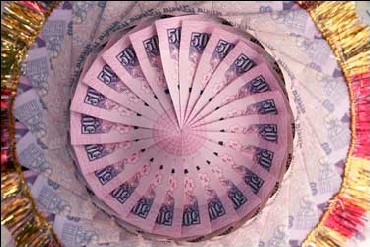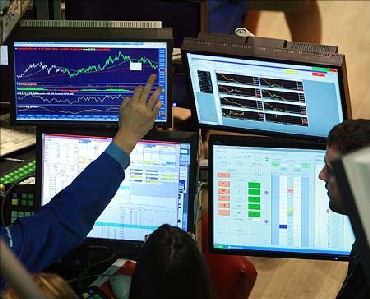 | « Back to article | Print this article |
Why foreign investors are painting gloomy India picture
If the latest strategy reports of some leading foreign institutional investors (FIIs) are anything to go by, then the outlook for the Indian equity market appears bleak. This is, despite section of experts pitching for the current attractive valuations.
While Credit Suisse is of the view that India's global linkages are now higher than what it was in 2008, CLSA has cut its year-end Sensex target by nearly seven per cent to 18,200. Morgan Stanley is also overweight on all BRIC (Brazil, Russia, India and China) nations, except India.
"While the sharp correction in the market may suggest attractive valuations, we note the pace of corporate earnings downgrades has intensified in the recent results season," said CLSA in its report released on Wednesday.
Click NEXT to read more...
Why foreign investors are painting gloomy India picture
"We lower 12-m Sensex target to 18,200 as we lower the target multiple to 13x to factor in the earnings downgrade risk," it said.
India's benchmark 30-share Sensex of the Bombay Stock Exchange (BSE) has declined more than 20 per cent from its peak in November last year, which technically means the index is in bear territory.
It is also one of the worst performers among all leading equity indices this calendar year. On Thursday, the Sensex lost 139 points to close at 16,146.
This time around, analysts are even skeptical in betting on the "decoupling" theory that would help India in tiding over the global uncertainty in a relatively better manner.
Click NEXT to read more...
Why foreign investors are painting gloomy India picture
In 2008, when the sub-prime crisis was at its peak, a section of market analysts were of the view that Indian domestic consumption would help the economy in "decoupling" from the then global crisis.
"India's global linkages are now higher than in 2008. Against the market consensus, we believe slowing global growth will expand the trade deficit and hurt GDP growth," said Credit Suisse.
It said corporate leverage has not improved, with companies with high leverage now more than in FY08. According to the Swiss major, around 50 per cent of the globally-linked Nifty EPS, which was largely uncut so far, is likely to see downward revisions.
Click NEXT to read more...
Why foreign investors are painting gloomy India picture
Credit Suisse is also worried over the fact that Indian companies are highly leveraged at a time when globally companies are trying to reduce the extent of leverage.
"While the world over the balance sheets of companies seems to have improved since the last crisis, the same has not happened in India. In fact, the number of companies with high leverage is now higher than it was in FY08."
Last week, when the Indian indices lost ground, they registered their fourth straight weekly loss - the longest losing streak since the collapse of Lehman Brothers in 2008.
Click NEXT to read more...
Why foreign investors are painting gloomy India picture
According to Bloomberg, earnings for 46 per cent of Sensex companies missed analyst estimates in the June quarter. That compared with 33 per cent which lagged behind forecasts in the previous quarter.
This comes on the back of Morgan Stanley downgrading India in its latest report on the emerging markets.
The report has maintained its underweight call on India and further reduced India's ranking from 15 to 16.
"India may not be able to respond given the starting point of a high fiscal deficit. In India, the government may focus more on boosting private sector confidence through policy reforms," said the report.





